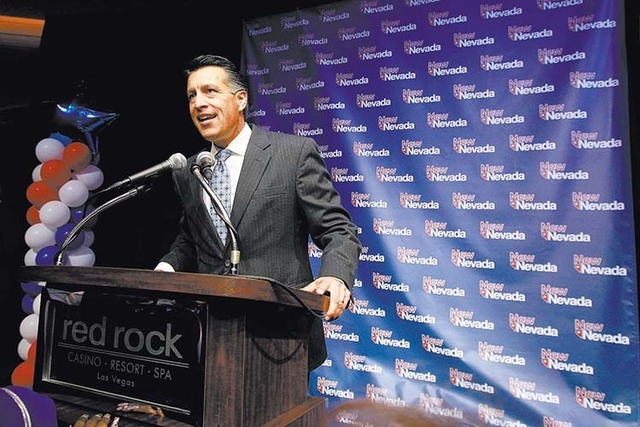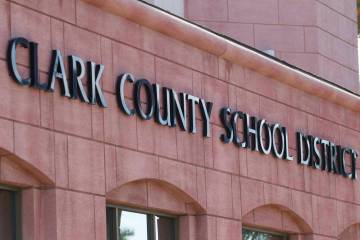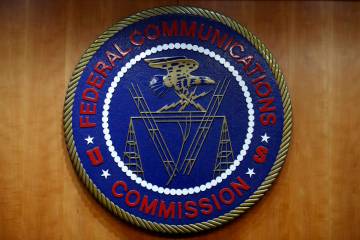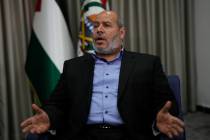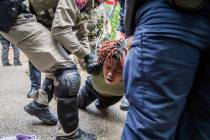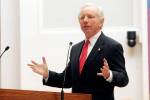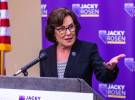Nevada winners, losers in Tuesday’s election
Republican Gov. Brian Sandoval was Nevada’s biggest winner in Tuesday’s election — and not just because he earned another four years in office in a landslide victory with more than 70 percent of the vote.
Thanks to a GOP wave and Sandoval’s political machine, starting in January he will preside over a state government and Legislature led entirely by Republicans, giving the governor more power to boost education, diversify the economy and possibly accomplish tax reform to reduce reliance on gaming, mining and sales levies.
The biggest loser was U.S. Sen. Harry Reid, D-Nev. Although Reid wasn’t on the ballot, he lost the Democratic majority in the U.S. Senate. His vaunted Nevada Democratic Party also failed to get voters to the polls to combat Republicans who booted incumbents up and down the ticket. The GOP cut short the political ambitions of rising Democratic stars such as Ross Miller, Lucy Flores and U.S. Rep. Steven Horsford, D-Nev., who all lost the most competitive races.
Here’s a look at the winners and losers.
WINNERS:
■ SANDOVAL: The governor faced a weak challenger in little-known Bob Goodman, 80, who wasn’t backed by the Democratic Party, which failed to recruit a top-tier candidate. This allowed Sandoval and his New Nevada PAC to focus on getting other Republicans elected, including his pick for lieutenant governor, state Sen. Mark Hutchison, R-Las Vegas.
Sandoval’s PAC also funded a group that ran attack ads against several Democrats running for the Nevada Senate, giving an edge to the GOP, which won three key races to take control of the body, 11 seats to 10.
“He personally became the Nevada Republican Party himself,” said Robert Uithoven, a consultant to Adam Laxalt’s winning attorney general campaign against Ross Miller, who had been seen as the front-runner. “And he became the most effective Nevada Republican Party our state has ever seen.”
■ REPUBLICANS: Nevada Republicans finally beat Democrats at their own get-out-the-vote game, registering new voters and getting them to the polls early.
In 2013, conservatives launched a new group, Nevada Engage, to register voters, adding more than 30,000 to the rolls — including thousands of nonpartisans who lean toward the GOP.
During the two-week early voting period, Republicans cast nearly 24,000 more ballots than Democrats. Then the GOP won Election Day, despite the fact that Democrats have about 62,000 more registered voters statewide than Republicans.
■ GOP LEADERS: Sen. Michael Roberson, R-Las Vegas, who will become the new Senate majority leader, recruited GOP candidates Patricia Farley and Becky Harris to run in two of the most competitive districts, 8 and 9 respectively.
He ran a disciplined campaign to take control of the Senate for the first time since 2007, costing Sen. Justin Jones, D-Las Vegas, his District 9 seat.
Assemblyman Pat Hickey, R-Reno, the minority leader, saw the GOP wave coming and convinced donors that Republicans had a chance to take control of the Assembly for the first time since 1985. The GOP won 10 seats, flipping the makeup to 25-17 seats for the GOP.
Republicans will lead all committees, increasing their clout and ability to pass — or kill — laws.
Many of the newcomers are conservatives, who on Friday pushed to elect Assemblyman Ira Hansen, R-Sparks, the new GOP caucus leader and designated speaker, making him the post-election winner.
“This is no small matter as multiple Republicans, while in the minority, often complained that their bills didn’t even get hearings when Democrats controlled committees,” said Eric Herzik, political science professor at the University of Nevada, Reno. “This will change as will the legislative agenda.”
■ HELLER: Now in the U.S. Senate majority, Dean Heller has an opportunity to build his brand and reach for new power outside of Reid’s long shadow. He is campaigning to chair the National Republican Senatorial Committee to keep Republicans in power in 2016. The top target will be Reid.
This year, Heller raised his profile by making more than $400,000 in contributions to GOP candidates and party organizations on the national and state levels.
■ REID OPPONENTS: Potential GOP opponents to Reid in 2016 all face better odds and a clearer path to defeat him, especially if Republicans unite behind one candidate. Names being floated include Sandoval, who will face growing GOP pressure to run; Hutchison; U.S. Rep. Joe Heck, R-Nev., who walloped his 2014 Democratic opponent Erin Bilbray, 61 percent to 36 percent; outgoing Lt. Gov. Brian Krolicki, and state Sen. Greg Brower, R-Reno.
■ RURAL/NORTHERN NEVADA: Nevada’s 15 rural counties demonstrated power by showing up in force to vote, leaning heavily toward GOP candidates to give them wins. Case in point is attorney general winner Laxalt, who lost both urban Clark and Washoe counties but beat Miller in the rurals. During the upcoming 2015 legislative session, Northern Nevada and the rurals will have more power as well as chairs of key committees, including the money panels.
■ GOP PRESIDENTIAL CONTENDERS: Nevada remains a swing state that’s up for grabs, and Republican candidates might have an advantage over a Democratic candidate such as Hillary Clinton if she is weighed down by Obama.
■ THE COURTS: The Nevada Supreme Court won its battle to get voter approval to create an appellate court to handle cases that take up too much of the high court’s time, including prisoner appeals and family matters. Question 1 passed 54 percent to 46 percent.
■ BUSINESS: A coalition of business groups overwhelmingly defeated a proposed 2 percent margins tax, which would have imposed the levy on businesses making $1 million or more in annual revenue, which was to be used for education. Question 3 was defeated 79 percent to 21 percent. The coalition included the Las Vegas Metro Chamber of Commerce, Nevada Resort Association, Nevada Mining Association and Retailers Association of Nevada.
■ MINING: The mining industry’s constitutional cap on taxation will remain in place, after Question 2 was narrowly defeated with 50.32 percent voting against the measure and 49.68 percent for it.
LOSERS:
■ REID: The senior Nevada senator’s strategy for protecting Democratic incumbents is being second-guessed with the GOP takeover of the U.S. Senate. His power is diminished as he embarks on what is expected to be a tough re-election fight in 2016 against energized Republicans nationally and in Nevada.
There also is more tension between Reid and President Barack Obama, whose unpopularity is being blamed for widespread Democratic losses.
At home, the Nevada Democratic Party that Reid built to ensure his and Obama’s 2008, 2010 and 2012 elections failed miserably against the GOP machine.
■ DEMOCRATS: The party’s candidates didn’t just lose individual races. They lost the ability this year to bring out key constituencies — Latinos, younger voters and the unions — they have relied on in the past.
Hispanics were disappointed about the lack of immigration reform. Unions were unhappy with Obamacare and the direction of the party. And young voters had no compelling top-of-the-ticket reason to show up, such as a hot gubernatorial, U.S. Senate or presidential race.
As well, Assembly Speaker Marilyn Kirkpatrick, D-North Las Vegas, and state Senate Majority Leader Mo Denis, D-Las Vegas, were unable to save incumbent lawmakers, even in Democratic districts.
■ UNIONS: Labor groups, including for state workers and teachers, fell down. Culinary Local 226 failed to save Horsford’s congressional seat and Jones’ state Senate seat in the final weeks of the election.
The AFL-CIO’s efforts to get out the union and Democratic vote also was a bust, despite door-to-door walks and phone banking. As a result, the GOP-led Legislature could change the public employee retirement system or fiddle with the collective bargaining law and weaken prevailing wage.
■ EDUCATION: The teachers union, or the Nevada State Education Association, failed in its effort to pass the proposed margins tax in Question 3, which would have raised some $800 million a year to pay for K-12 education.
Failure of the mining tax Question 2 also has an impact, because lawmakers could have used any added revenue from the highly profitable industry for education as well.
Under Sandoval’s leadership and with a GOP-led Legislature, teachers might face new performance standards and school choice, which they generally oppose as part of a voucher system.
■ DEMOCRATIC VOTERS: You snooze, you lose. They stayed home far more than Republicans in a year in which voter turnout was 45.51 percent, the lowest rate in a Nevada general election since 1978.
■ POLITICAL AMBITIONS: Several Democrats took a career hit, notably Miller, Horsford, Flores and Kate Marshall, the state treasurer who lost the secretary of state’s race to Republican Barbara Cegavske of Las Vegas. Marshall in 2011 lost a special congressional election to U.S. Rep. Mark Amodei, R-Nev., as well, for two losses in a row.
Miller, a two-term secretary of state and the son of former Gov. Bob Miller, hopes to follow in his father’s footsteps, but his defeat in the attorney general’s race interrupts his path.
Flores, a two-term assemblywoman, was touted on the national stage as the future of Latino politicians, but failed in her first big race for lieutenant governor.
Horsford, Nevada’s first African-American congressman and a former state Senate majority leader, took a header in his re-election bid. Horsford is expected to try and win back his seat in 2016 when the national atmosphere might be friendlier for Democrats. And Miller and Flores aren’t expected to leave their ambitions behind either. Marshall’s fate is less clear.
■ SOUTHERN NEVADA: With Democrats weakened and with the failure of the mining tax referendum, Southern Nevada will continue to provide more money disproportionally to the state’s nearly $7 billion general fund, said David Damore, political science professor at the University of Nevada, Las Vegas.
The region also will send legislators to Carson City who will have diminished clout, with northerners and rural Nevadans heading most major committees.
■ ONLINE GAMING: On a national level, supporters of federal legalization of Internet gaming won’t see the issue gain any traction in Washington, D.C. With Republicans taking control of the U.S. Senate and gaining a larger majority in the House, various federal bills to legalize, tax and regulate aspects of Internet gaming have little chance of surfacing. Also, with Reid losing his majority leader title, supporters of online poker lose an advocate.
“I think the Senate transition away from Reid is, on the surface, bad for Internet gaming,” Macquarie Securities gaming analyst Chad Beynon said Wednesday.
As for Nevada, the changes in Carson City won’t have any impact on Internet poker at a state level. Sandoval remains supportive of Nevada’s current online gaming regulations.
Review-Journal writer Howard Stutz, Capital Bureau reporter Sean Whaley and Stephens Washington Bureau Chief Steve Tetreault contributed to this report. Contact Laura Myers at lmyers@reviewjournal.com or 702-387-2919. Find her on Twitter: @lmyerslvrj.
Hansen of Sparks named Assembly speaker designee
CARSON CITY — The new GOP majority in the Assembly late Friday named Assemblyman Ira Hansen of Sparks as the speaker designee for the 25-member caucus. And on Saturday, he named committee chairs.
Friday’s brief announcement came after a meeting lasting several hours in Las Vegas. He will formally take over from Speaker Marilyn Kirkpatrick, D-North Las Vegas, in February when the session begins.
"It is a tremendous honor and privilege to serve the people of Nevada and I look forward to meeting with (Gov. Brian) Sandoval and Senate Majority Leader (Michael) Roberson to join together in continuing to move Nevada forward," Hansen said.
The vote for Hansen means that Reno Assemblyman Pat Hickey, who has served as the Assembly GOP minority leader in previous sessions, will not continue as the caucus leader in the 2015 session. He also will not be chairing any committees.
Hansen, a conservative member of the Assembly, was first elected in 2010 and served in the 2011 and 2013 sessions.
Hickey, R-Reno, has been serving as the Assembly minority leader. But Republicans were thrust into the majority on Tuesday when voters turned out six Democratic incumbents and filled four empty seats previously held by Democrats with GOP candidates.
The pickup of 10 seats turned the 15-member GOP minority into a 25-member majority, giving Republicans control of the Assembly for the first time since 1985. Only 12 members of the caucus are veterans however, making the GOP’s first chance to govern the Assembly in 30 years a challenge.
Chair appointments announced Saturday include:
▶ Paul Anderson of Las Vegas, Ways and Means
▶ Wes Duncan of Las Vegas, Judiciary
▶ Randy Kirner of Reno, Commerce and Labor
▶ Melissa Woodbury of Las Vegas, Education
▶ John Hambrick of Las Vegas, Government Affairs
▶ James Oscarson of Pahrump, Health and Human Services
▶ Lynn Stewart of Henderson, Legislative Operations and Elections
▶ John Ellison of Elko, Natural Resources, Agriculture and Mining
▶ Michele Fiore of Las Vegas, Taxation
▶ Jim Wheeler of Minden, Transportation
The caucus on Friday announced that Anderson will be Assembly majority leader.
"Nevada’s continued comeback is our top priority," Anderson said. "I look forward to working with the Senate and governor to accomplish great thing for all of Nevada."
Anderson congratulated Hansen and said he looks forward to "a strong united front as we move forward with the business of the state."
Conservative GOP activist Chuck Muth said Hickey was ousted because "he didn’t show enough respect to the conservative members of his caucus in the last session, because he supported moderate challengers this year against conservatives who ended up winning GOP primaries anyway, and he didn’t give the time of day to other conservative Republican candidates in the general election who he incorrectly thought didn’t have a prayer. He reaped what he himself sowed."
Republicans swept to power in the Assembly with the Republican "red wave" that saw the party take over the state Senate and all statewide constitutional offices in the Tuesday election.
It will be the first session since 1929 that the governor and two houses of the Legislature are all Republican.
Sean Whaley/las vegas review-journal



